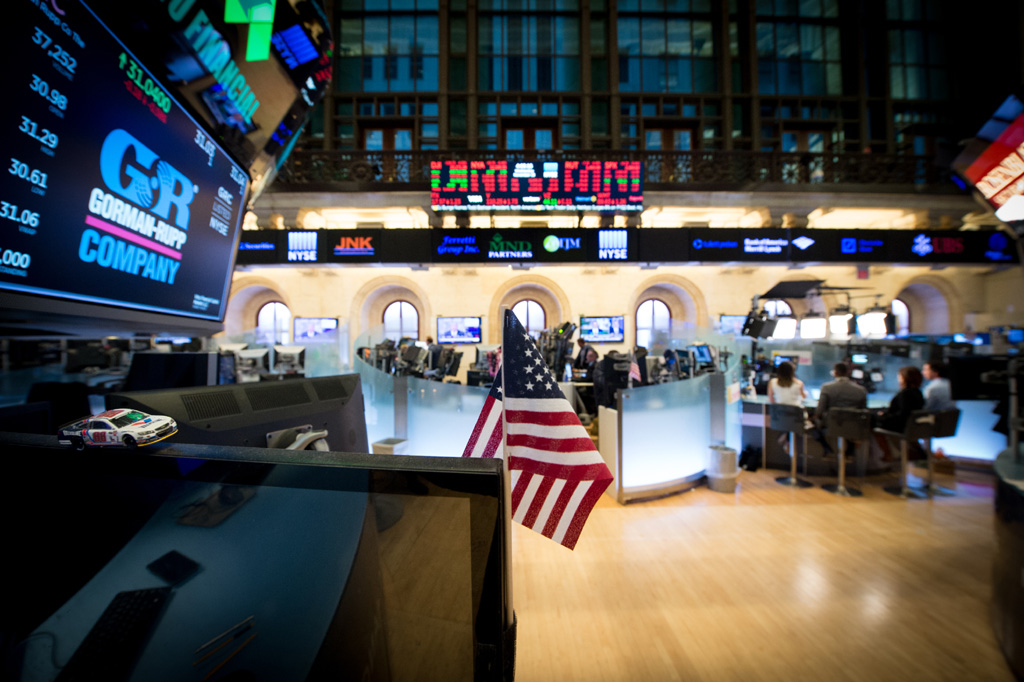 LONDON: World stocks slipped on Friday as expectations that trade tensions will dominate this weekend's summit of G7 countries and renewed talk of monetary tightening by major central banks weighed on risk sentiment.
LONDON: World stocks slipped on Friday as expectations that trade tensions will dominate this weekend's summit of G7 countries and renewed talk of monetary tightening by major central banks weighed on risk sentiment.
The MSCI All-Country World index, which tracks shares in 47 countries, was down nearly half a percent by afternoon in Europe, although it was still on track to break a three-week streak of losses. Futures indicated Wall Street was set to open lower. NQc1>
Fears of a trade war, expectations of more rate hikes in the United States, and the prospect that the European Central Bank will soon signal a winding-down of its massive monetary stimulus all contributed to the risk-off tone, investors said.
The US Federal Reserve is widely expected to raise interest rates next week, its second hike this year, and may hint at four rate increases in 2018 rather than the three that have been widely anticipated.
ECB policymakers meeting on June 14 will debate whether to end bond purchases later this year, the bank's chief economist said this week. His hawkish message sent the euro to a three-week top, hit emerging markets, and spurred demand for safe-haven bonds.
Before those meetings, however, markets will watch the fallout from the G7 summit in Quebec, where the mounting risk of a tariff war between the United States and its major trade partners will be in the spotlight.
Officials concede the mood around the summit is likely to be exceptionally tense. US President Donald Trump says tariffs are needed to protect US industry, but Canada and the European Union have denounced them as illegal and are preparing retaliatory measures.
French President Emmanuel Macron warned Trump in a rare rebuke on Thursday that the other six members of the G7 could form their own grouping if necessary, adding that "nobody is forever".
"None of this makes investors particularly hopeful that the two 'allies' will reach an agreement and avoid an escalation of the trade spat that has caused so much worry for investors," said OANDA markets analyst Craig Erlam.
"They (investors) may have taken last week's tariffs in their stride, largely because it had been lined up for months and priced in" but further escalations will hit confidence in the markets and could trigger further corrections, he added.
An unprecedented US-North Korea summit scheduled for June 12 in Singapore, with Washington seeking to pressure Pyongyang into abandoning its nuclear weapons programme, is giving investors another reason for caution.
MSCI's broadest index of Asia-Pacific shares outside Japan fell 1.1 percent after six straight sessions of gains took it to its highest since mid-March. It was on track for a weekly gain of more than 1 percent.
Chinese shares slipped, with the blue-chip Shangai-Shenzhen index down 1.7 percent and Hong Kong's Hang Seng .HSI declining 1.5 percent.
Japan's Nikkei average and South Korea's KOSPI were off 0.6 percent and 0.8 percent, respectively, while Australian shares ended 0.1 percent lower.
The pan-European STOXX 600 index was on track for its third weekly loss in a row, with renewed strength in the euro also weighing. It was last down 0.3 percent.
Italy's government bonds faced renewed selling pressure, as the risk aversion in world markets and unease about Rome's spending plans set yields on short-dated debt up for their biggest weekly rise since 2012.
"A few things are contributing to nervousness today -- the trade issues are back on, then there is the Italy situation and we are not sure how the ECB will respond to that," said Salman Ahmed, chief investment strategist at Lombard Odier Investment Managers.
"And in emerging markets there are some idiosyncratic risks (Turkey, Argentina and Brazil) which are becoming worrying." He remained "cautious" on adding risk, as "none of these issues seem to have a clear short-term resolution."
DOLLAR OFF LOWS
The dollar rebounded almost half a percent from near three-week lows against a basket of currencies, helped by the strong jobless claims numbers in the US on Thursday.
It has come under pressure this week as the euro bounced back from 10-month lows thanks to ebbing political concerns over Italy and the possible ECB moves over its bond purchases.
The dollar fell against the Japanese yen to 109.25, but remained well below a four-month top of 111.39 touched in May. The euro fell over half a percent to $1.1732 after four straight sessions of gains took it to its highest since mid-May.
Oil prices fell as surging US output and signs of weakening demand in China outweighed support from supply woes in Venezuela and OPEC's production cuts.
US crude fell over half a percent to $65.59 a barrel, while Brent dropped 0.9 percent to $76.64.
Spot gold slipped 0.1 percent at $1,298.63 an ounce.


























Comments
Comments are closed.